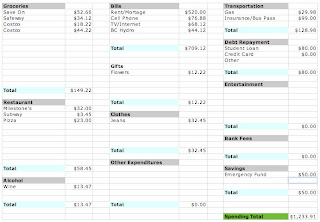I think a lot of us think we know where our money goes. We might not write it down or record it, but we don't need to. We know approximately how much money is in the bank, and we know about how much we've bought. If we think hard, we might even be able to label prices with purchases. For example, a Subway sandwich costs three and a half dollars, and when we went to see the movie last week we spent $20. However, I think the reality of our spending is completely different from what we think it is.
For example, when I started recording where I was spending my money, I was shocked to see how much money I was spending at the grocery store. I knew I was eating a lot of food, and that I especially enjoyed ice cream and snacks, but I had no idea I was spending $300-350 a month on groceries. I thought I was spending $150, maybe $200, but certainly not twice that. It is downright shocking to add up how much money I was spending on certain categories. Not all the surprises were bad. I thought I was buying a lot of beer, but it averaged to about $20 a month, not including if I purchased something while I was out for dinner.
Tracking my money was the first step towards financial responsibility. Before I was keeping track of my spending I thought I was being responsible, because I wasn't spending more money than I made, at least most of the time. Financial ignorance, however, is often irresponsible, and there are no excuses for it.
Now, keeping track of spending doesn't have to be a difficult thing. You might think that you'll have to start getting receipts for everything, or writing down all your purchases as you make them throughout the month. While this does work, and is highly recommended for some people, I think that we are of a generation that will not put up with that hassle. Instead, I use the benefit of technology to assist me. I make almost all of my purchases using a debit or a credit card. I very, very rarely pay cash. This allows me to go back over my bank and credit card statements, and everything that I've purchased is listed for me. I just copy the numbers down onto my spread sheet and into the appropriate category. The spreadsheet even does all the adding for me, so that the totals are easily viewable. This works for me because I very rarely use cash. If you do use a lot of cash, it is not traceable after the fact, so you might have to start collecting those receipts. This whole process only takes me about 20 minutes every month. Sometimes I'll wait a couple of months and then go back over them all at once.

For me, I managed to bring down my average grocery bill to $190/month over the last three months. That's a savings of about $110/month. I think that just the recognition of the overall monthly cost of silly snacks or food that went bad made me a little more hesitant in Safeway and at Costco. It's a quick and easy way to save money, and at the same time, you're informing yourself of your spending habits so you can plan for them in the future.
What about you? Where are you spending more money than you thought you were? Where are you spending less? Any place you think you can reduce costs without much effort? Put that savings into your high interest online savings account!
Potential savings: $30+ per month. Total savings this month: $43
Want a copy of that spreadsheet for your own, personal use? Comment below, or on the wall of The Great Blog Off and ask for one.





Hey Alan... this is good stuff, could I get a copy of the spreadsheet?
ReplyDeleteAlex
alexander.toney@gmail.com
Done deal, email sent.
ReplyDelete